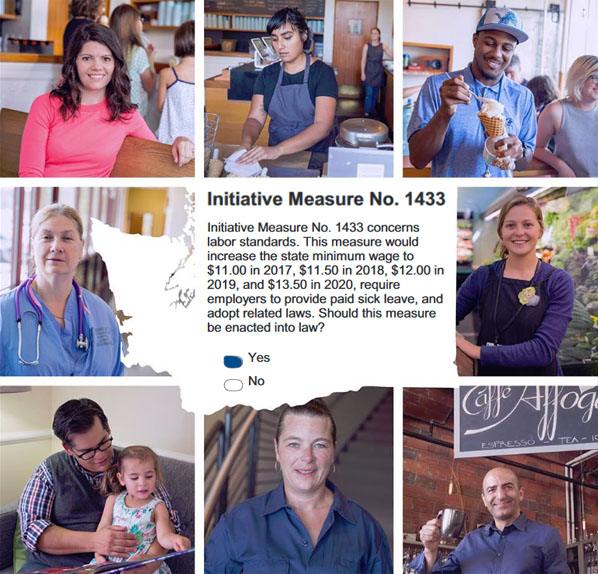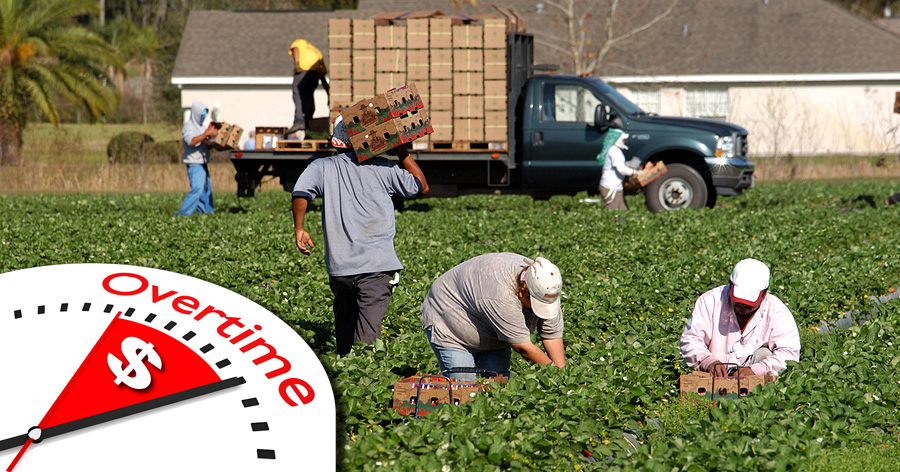STATE GOVERNMENT
New year brings wage increase, overtime pay
OLYMPIA (Jan. 4, 2022) — On Saturday, Jan. 1, the Washington state minimum wage increased and thousands more workers — including farm workers — gained access to overtime pay protections, all thanks to policies strongly supported by the state’s labor movement.
The state’s minimum hourly wage increased 80 cents to $14.49 per hour on Saturday, after a 5.83 percent increase in the Consumer Price Index for Urban Wage Earners and Clerical Workers. The U.S. Bureau of Labor Statistics attributed the increase to more expensive gas, housing, household furnishings, and food.
 That inflationary increase comes each year as a result of the passage of Initiative 1433, a successful ballot measure proposed and supported by the Washington State Labor Council, AFL-CIO (WSLC) and a coalition of labor and community allies in 2016. Thanks to I-1433, all workers in Washington state also receive paid sick leave, earning at least one hour of it for every 40 hours worked and allowing workers to carry over up to 40 hours of unused sick leave from one year to the next. This is a critically important benefit as the COVID-19 pandemic rages on.
That inflationary increase comes each year as a result of the passage of Initiative 1433, a successful ballot measure proposed and supported by the Washington State Labor Council, AFL-CIO (WSLC) and a coalition of labor and community allies in 2016. Thanks to I-1433, all workers in Washington state also receive paid sick leave, earning at least one hour of it for every 40 hours worked and allowing workers to carry over up to 40 hours of unused sick leave from one year to the next. This is a critically important benefit as the COVID-19 pandemic rages on.
The state minimum wage applies to workers age 16 and older. Under state law, employers may pay 85 percent of the minimum wage to workers ages 14-15. For 2022, the wage for that younger age group will be $12.32 per hour.
In Seattle and SeaTac, minimum wage rates are higher. Complete information about the minimum wage is available on the state Department of Labor and Industries website, as well as details about rest breaks and meal periods.
Also on Jan. 1, thousands more workers in Washington gained more time to spend with their family and friends, more overtime pay, or a little of both.
That’s because the state’s overtime pay standard continues to phase in increases in the salary threshold below which all workers must be receive time-and-a-half overtime pay for hours worked beyond 40 per week. The minimum salary an employee must earn to be considered overtime-exempt has risen to 1.75 times the minimum wage, or $1,014.30 per week ($52,743 per year). Any salaried worker earning less than that has the right to receive overtime pay. L&I estimates that some 19,000 more workers in the state will gain overtime protection as a result. Learn more at L&I’s overtime web page.

And under an historic new law, Washington’s farmworkers will be eligible to earn overtime, for the first time, starting this year.L&I estimates that some 275,000 agricultural workers, at the peak of the season, will be impacted by the new law, which includes a three-year phase-in schedule. It incrementally reduces the number of hours worked by farmworkers before they are entitled to overtime pay:
- As of last Saturday: 55 hours in a workweek;
- As of Jan. 1, 2023: 48 hours in a workweek; and,
- As of Jan. 1, 2024: 40 hours in a workweek.
Dairy workers are already eligible to earn overtime after working 40 hours in a workweek. Learn more at L&I’s agricultural overtime web page.





